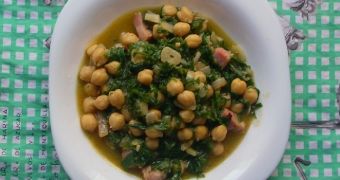PepsiCo has announced its partnership with the United States Agency for International Development (USAID) and the World Food Program (WFP) in order to launch the Enterprise EthioPE.
This innovative program will allow the development of the food security system in Ethiopia, while boosting the chickpea production in the region, and most likely, the entire local economy.
PepsiCo tries to expand its budget to support the expansion of its healthy line products while making sure that they will have enough Ethiopian chickpeas to supply the production of Sabra hummus, one of their products created in partnership with Strauss Group Ltd.
Skeptics are now concerned about the nature of this initiative. Officials in the food industry claim that PepsiCo's strategy to support the “healthy” line of products while raising the Ethiopian economy doesn't come out of altruism.
They fear that this project is based on a new marketing strategy, developed in order to grow the company's own profit margins.
“It’s not altruism: Pepsi wants access to a lot of chickpeas, because that’s what they want to sell us. PepsiCo has a vested interest in the project that goes beyond just helping Ethiopians; the company wants more of a chickpea supply for its products,” declared Ariel Schwartz from Fast Company.
Despite future speculations which regard this matter, officials from PepsiCo stated that a fragment of the chickpea production will respond to the needs of 40,000 Ethiopians who are facing malnutrition at this point in time.
It's a start, and Pepsi tries to expand this strategy to a another level, by teaching the local people how to value the potential of this highly beneficial vegetable.
After improving the agricultural techniques, the people might be able to obtain more than a single harvest every year, in the near future. Also, they will be able to exploit the chickpea's ability to extract nitrogen from the air, unlike other crops which take it only out of the soil.
In order to expand their strategy on a national scale, the companies will work in partnership with 10,000 local farms, whose owners will be taught how to use drip irrigation techniques and premium seeds.
The progress won't be noticeable at first, but enterprises that joined efforts for this cause say that the Ethiopian nation will experience significant benefits once this measure will be implemented.
“The tough reality is that crops grow as fast as they grow. Some 12 million people will remain in need for years after this famine ends, though, and we might have some impact on them,” concluded Derek Yach, PepsiCo spokesperson.
Despite the fact that the competition in the food industry tends to refer to PepsiCo's initiative as a selfish path of making profit, the project will most likely improve the lives of individuals from local communities, who are presently starving.
It's true, PepsiCo will probably turn its contribution into millions of dollars. But nothing is free nowadays, not even a chickpea bean.

 14 DAY TRIAL //
14 DAY TRIAL //